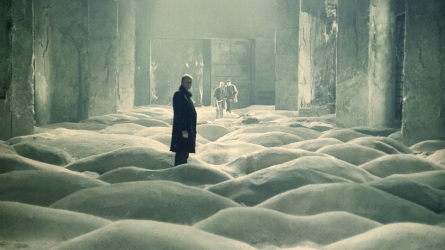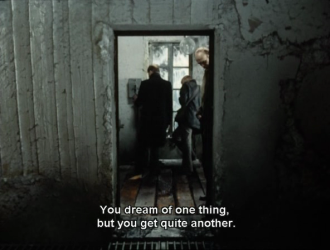And sometimes ya gotta see a three hour Soviet-era metaphysical Russian movie with lots of long, slow tracking shots, huge sequences without dialogue, and no clear explanation of what the hell’s going on.
I mean, ya gotta if you’re The Boy and I. Also, if you’re The Boy and I, you’re going to love it, and lament you can’t make the trip back downtown for the showing of Solaris, the director’s similarly paced, ambiguous space film, showing the next week.
Sometimes you can’t recommend a film to just about anyone, no matter how much you like it. This is one of those films. I should point out that this had been recommended to me by Sue (@Sky_Bluez), though, and I would have equally strongly recommend it to her, had I seen it first. But she’s about it.

What the…?
The story is this: There is a place in the country called The Zone. It’s unclear what created this area, but it is full of existential peril. A small subset of people, known as Stalkers, are the only ones who can lead people in and out of The Zone safely. Why go in The Zone? Because deep in the heart of The Zone—and by “deep in the heart”, we surely mean metaphorically, since literal space is hard to track in this film—is a room that grants those who enter their heart’s desire.
People get this wrong and say “it grants a wish” but it doesn’t, and this is important, and very Russian, as we’ll see in a bit.
Anyway, our Stalker is leading two characters on a journey to The Room: A writer and a professor. Our Stalker is introduced in a scene where his wife/mother of his (crippled? mutant?) child begs him not to go back into The Zone, much in the way a woman might beg her man to stop drinking. But of course he goes (or we ain’t go no pickcha), apparently at the risk of being sent to jail for it.

And then there’s this dog.
First, let’s look at the space issue. The beauty of this film is that it shows you as literally as possible the space that the action takes place in. The average shot length is around a minute, but there are many shots that are much longer, with slow pans across the “stage” that seem to loop around and reveal something about the space that you wouldn’t have thought possible. (Things like characters exiting stage right and re-emerging stage left. On an actual stage, this is no biggie, but when you’re tracking in a real world building, it’s both disorienting and oddly anchoring, because you end up with a very clear idea of the space but not how the characters can move in it the way they do.)
The space of The Zone is literally treacherous, however. The Stalker warns people that they can’t just cross from point A to point B. The one time a character tries that, he almost gets to point B before starting to believe The Stalker is right and retreating. (A voice calls out to him “Stop. Don’t move.” But whose voice?) There’s another point where a character The Stalker guarantees is a goner for having gone back (you can’t go back—only forward) is not only fine but has made his way easily to the point the Stalker and the other member of the party struggled to get through.
There are a lot of biblical references in this Soviet-era film. The filmmaker denied any religious interpretation (as he would, though he could’ve spoken out in the short time between his defection and death by lung cancer). It seemed to me, however, that The Stalker mapped pretty neatly as a kind of deconstructed (Orthodox Christian) cleric: He leads people to spiritual truth but cannot partake of it himself. He has a faith he desperately needs mixed with a deep cynicism, because the spiritual truth is not pretty.

And this tunnel…it may kill you.
This goes to the wish thing: The Room doesn’t grant your wish, it grants your deepest desire. Even if you go into it thinking “I’ll wish for world peace!”, you may wind up with hookers and blow. That’s one reason The Stalker never goes in The Room himself. The other reason is that, once you go in The Room, you can’t go back into The Zone. (I think that was the case, anyway. It was three hours long after all…) Yet another reason is that, of all the people he has led to the room, not one has found happiness. (Russian, eh?)
At the end, it’s not clear to me who goes into the room and who doesn’t. I think The Stalker himself might’ve gone in, and the movie teases us by making it look like his girl is walking at one point. But she isn’t, so did he go in and discover his wish wasn’t her health? Or did he not go in? Or…given the final scene where she can be seen with something like mutant superpowers, did he go in and unlock something else?
Maybe it’s just pretentious claptrap.
It was based off a sci-fi story but Tarkovsky radically reworked it into its metaphysical form, which makes some of the more traditional sci-fi tropes (nuclear weapons, mutations, etc.) stand out in an almost jarring fashion.

Can’t even trust your own dreams.
There are trains in the movie that pass on four different occasions. On each occasion, at the height of the noise, music can be heard under the noise. “Ode to Joy” once. Ravel’s “Bolero” another time. Tarkovsky had a complex relationship with music in his movies. Well, maybe not that complex. He didn’t like it, thinking it distorted the emotions of the scene. (Which is of course the point, and one he must’ve realized since he didn’t move completely away from music till the very end of his career.)
There’s a Wizard of Oz quality: The movie starts in sepia and goes full color once they enter The Zone. Though there’s no literalization of it, the movie seems to have a happy ending. The final scenes are gently colored and lit and the sound is more soothing, and Mrs. Stalkera (“Stalker” declines to “Stalkera” in the Russian tradition) delivers a soliloquy to the audience about suffering being necessary to appreciate happiness. What it portends, I do not know.
Then there was the dog. I still don’t know what that was about.
It’s real Russian, as noted, though not real Soviet. (The government didn’t care for it, but 1979 wasn’t 1949.) To get into The Zone, you have to risk your life getting past soldiers set up at checkpoints to keep people out. (Much like getting out of a Communist country?) The Stalker explains that The Zone is dangerous, but it was the discovery of The Room, and its wish-granting power that caused the government to crack down against those who would venture into it.
It came off as pretty anti-government to me. Perhaps predictably, it came off as anti-materialistic as well. And, it doesn’t really have a lot of nice things to say about religion, except that in the context of the choices given (i.e., worship of government, worship of stuff, or worship of something higher), it’s possibly not just the best, but also the only choice.
Anyway, from all my rambling, you can see that we thought there was a lot here for us to like, and if you’re a patient movie viewer who enjoys doing a lot of the heavy lifting you might enjoy it, too. But otherwise you’ll want to steer clear.

Sometimes I feel like this guy.

2 thoughts on “Stalker (1979)”